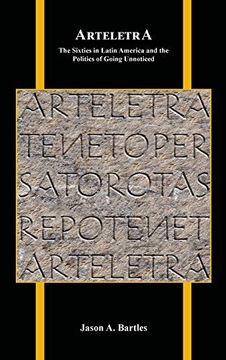Arteletra: The Sixties in Latin America and the Politics of Going Unnoticed: 81 (Purdue Studies in Romance Literatures) (in English)
Synopsis "Arteletra: The Sixties in Latin America and the Politics of Going Unnoticed: 81 (Purdue Studies in Romance Literatures) (in English)"
Arteletra analyzes the Sixties in Latin America in order to revisit the core claim of literary and cultural studies to political relevancy in the contemporary world: the task of making visible the invisible. Though visibility can secure rights for the disenfranchised, it also risks subjecting them to the biopolitical and capitalist arrangements of space. What is at stake in this book is a series of aesthetic and ethical tools for engaging in politics - defined here as the potential to disagree - without first passing through visibility. These tools cohere around a practice Bartles calls ""the politics of going unnoticed,"" which he derives from an archive of three noteworthy, though under-appreciated, authors who wrote during the Sixties: Calvert Casey (1924 - 69), Juan Filloy (1894 - 2000), and Armon?¡a Somers (1914 - 94). For the first time ever, Casey, Filloy, and Somers are put in dialogue with one another to further demonstrate the unique contributions of Latin American writers to contemporary debates about the cross?¼roads of literatures and politics. What unites them is their shared investment in stories about those who go unnoticed. As a practice, going unnoticed creates space and opportunities for queer, rural, and female subjects, among others, to step back from unjust institutions. As a political discourse, going unnoticed deactivates the binary structures of biopolitics (e.g., visible/invisible, pure/filthy, friend/enemy) that divide humans from one another in the service of power and economic inequality. Though the politics of going unnoticed was ignored during the Sixties for its apparent individualism, these three writers work through alternatives to the politics of visibility that has animated political discourse on the left for the last half-century. More than a self-interested critique, going unnoticed opens new possibilities for engaging in the messy business of politics while imagining and creating better communities.

